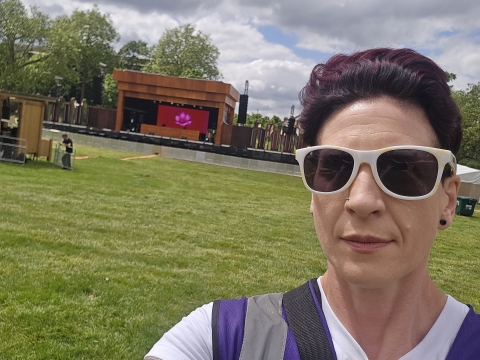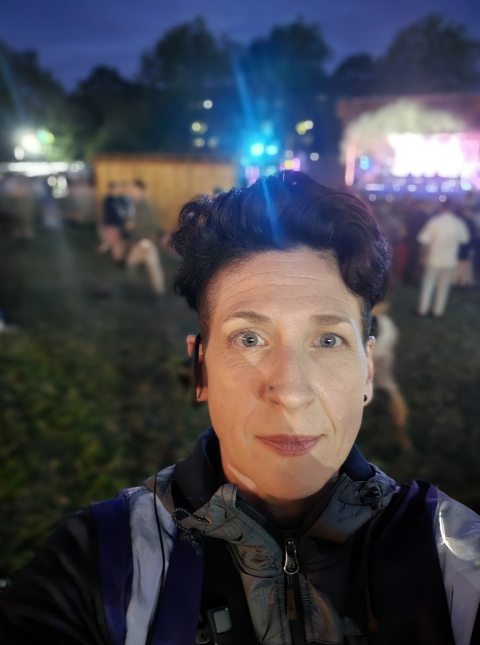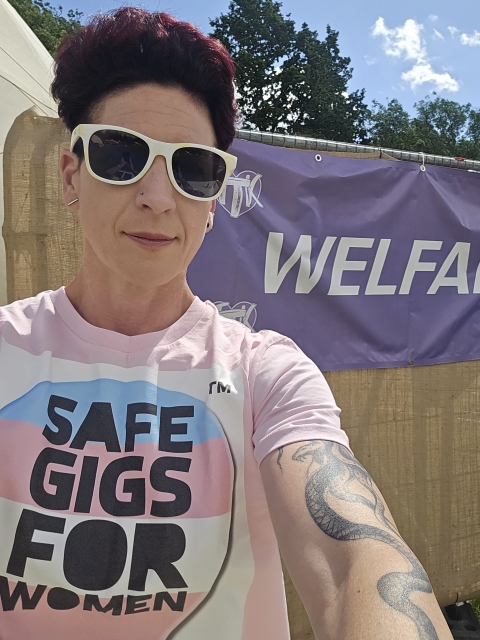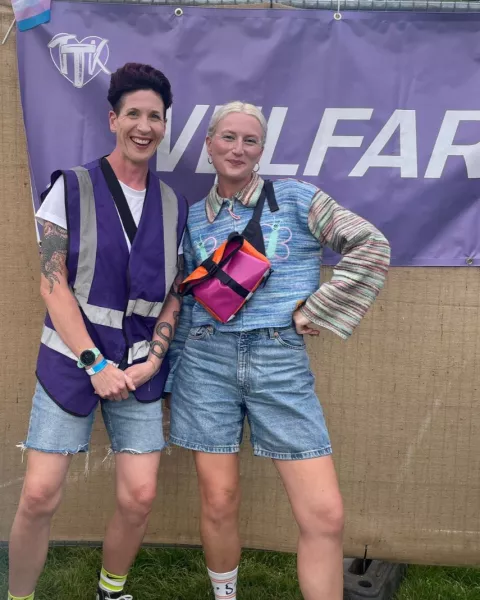

Each month, the Graduate School is sharing a Student Spotlight with our postgraduate research community, highlighting the amazing research being undertaken by our postgraduate researchers.
3 minutes
Our Student Spotlight for June is Gemma Summers-Green, who is undertaking a PhD in the School of Strategy, Marketing, and Innovation.
I am a first-year PhD by compilation student, having successfully obtained a bursary to study the prevention of VAWG (violence against women and girls) in the NTE (night-time economy) within the School of Strategy, Marketing, and Innovation as of October 2023. My research focuses on UK-based music festival spaces and VAWG prevention, an area with a very small pool of academic literature to draw on.
I joined the University of Portsmouth postgraduate research community following a long career working within the fields of stalking, sexual violence, and domestic abuse. I worked in senior management in the anti-violence sector for national organizations including Rape Crisis, Women’s Aid, and the Suzy Lamplugh Trust for over two decades, accumulating a vast portfolio of experience and expertise in relational harm and interpersonal trauma. Alongside this operational work, I am also a qualified MBACP psychotherapist, working in private practice with women and gender-diverse people who have been subjected to sexual harm.
This relational work, with an emphasis on ethical practice and my training in interpersonal trauma, has already supported my project here in SMI, particularly when designing the ethics process for my first two projects: a series of semi-structured interviews with festival workers and an ethnographic study on-site at five music festivals across the UK.
Why Music Festivals?
For the past 12 years, in my spare time and during periods of study, I have volunteered and worked at UK-based festivals, offering my expertise. I have facilitated training for Oxfam, Victorious Festival, Boomtown, and many welfare organisations on bystander models and co-designed awareness campaigns to address abuse within festival sites. In more recent years, I have also worked in an operational capacity on-site during festivals, responding to reported incidents of sexual violence and ensuring that people are supported on-site and signposted to support off-site. I have also supported on-site police investigations into serious incidents.
In addition to my own experience and operational practice, I became very aware of the lack of academic literature on festival spaces and VAWG. When I successfully applied for my PhD, I was keen to draw on this area of work and apply it to a social marketing lens for my research.
I have just completed my first project and am in the process of writing my first paper. This project interviewed 23 experts working across the UK music festival industry and, to my knowledge, is the first study of its kind. I am now working on my second project, an ethnographic observation of music festival sites across the UK, where I use my on-site work to inform my research, building theory as I go along. It will probably come as no surprise that this research is a qualitative study, using grounded theory to co-develop a model for preventing VAWG at music festivals. This model incorporates social marketing and draws on a number of theoretical lenses, including feminist theory.

Roaming Welfare as the evening approaches in festival spaces can be an incredible resource for people who can stop me and say hello or reach out because they are not ok. Roaming Welfare is a support service offered at some UK based festivals.

Welfare support at UK based music festivals can play an important part in festival goers physical and psychological safety.
If You Are Attending a Music Festival in the UK, Here Are My Top Tips:
As we are now in the UK festival season, I thought I would take this opportunity to share my top festival tips. Whether you are going to your first festival or are a seasoned festival-goer, each event and site is unique, so please research your journey and the site provisions as well as the line-up!
- Familiarise yourself with the site map and screenshot it in case the app crashes or you lose WiFi.
- If you’re going with someone or in a group, identify a meet-up spot in case any of you get separated. There are usually flags or unique spots within a festival site that you could use.
- If you are camping, arrive early to set up camp as a group, creating a space for yourselves using your tents as a kind of boundary.
- Take an extra phone charger with you and/or identify if there are charging stations on-site.
- Identify if there is a bag drop if you are going for the day.
- Establish if there is on-site welfare for any personal or emotional needs you might have. Welfare also provides sun cream, period products, and a quiet place to chill, so this is a helpful resource for any festival-goer.
- Take SUN CREAM. All skin types can burn, and sometimes there is a lack of shade.
- Prepare for all weathers - we all know what the UK weather is like.
- Look out for one another - festivals were originally based on community and a sense of everyone coming together.
- Report anything unwanted or anything that makes you feel uncomfortable to welfare or security. If you do not want to engage with security professionals, look for welfare, who can offer listening support and take your report seriously.

Gemma spoke with Eliza from Cheer Up Luv as part of her women's safety at UK based music festivals.
I am committed to people living their lives and attending festivals free from abuse and harm. For me, it’s a fundamental right, and I am hopeful that my research can contribute, in a small way, to a safer, more liberating festival experience for everyone who chooses to attend. I hope all festival-goers reading this have a really enjoyable experience.
If you would like to feature in our student spotlight section please email graduate.school@port.ac.uk to discuss this further.





